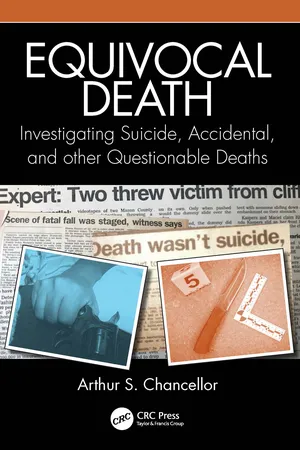
Equivocal Death
Investigating Suicide, Accidental, and other Questionable Deaths
- 296 pages
- English
- ePUB (mobile friendly)
- Available on iOS & Android
Equivocal Death
Investigating Suicide, Accidental, and other Questionable Deaths
About this book
Equivocal Death: Investigating Suicide, Accidental, and other Questionable Deaths refocuses the attention of first responders and investigative personnel to the concept of treating every death as a homicide, until sufficient evidence is discovered to validate another manner of death and eliminate the possibility of a staged homicide.
All death investigations should include a well-documented and examined crime scene and a thorough preliminary investigation. It is a well-established, unwritten "rule" when conducting death investigations to initially treat every death as a possible homicide. This includes the examination of the body, the recovery scene, the autopsy, collection of forensic evidence, and subsequent laboratory analysis. Police and investigators are often confronted with a death scene that they cannot initially determine the manner of death; these instances are known as equivocal death.
Coverage focuses on the basics of death investigation and the how to's rather than dwelling on extraneous and unnecessary detail. By example, it is generally more important for the detective or CSI to understand how to properly pick up forensic evidence at the scene, and how the resulting analysis relates to their investigation, rather than the mechanics of how the evidence is extracted and analyzed at the lab. For suicide and equivocal deaths, it is likewise important that detectives also understand the importance of such things as a victimology assessment, risk factors, and/or ante mortem behaviors of the victim, cues that may provide clues that would be consistent with someone contemplating suicide. The book also features several aspects of criminal investigation that are not found in similar books, including coverage of victimology, including crime scene staging, the notion of psychology autopsy, and how to identify those risk factors or behaviors that are consistent with suicide including motive, intent, and ability.
Equivocal Death: Investigating Suicide, Accidental, and other Questionable Deaths serves as an essential reference for the detective, crime scene investigators, coroners and medical examiners, medicolegal investigators, and prosecutors actively involved in these types of cases.
Frequently asked questions
- Essential is ideal for learners and professionals who enjoy exploring a wide range of subjects. Access the Essential Library with 800,000+ trusted titles and best-sellers across business, personal growth, and the humanities. Includes unlimited reading time and Standard Read Aloud voice.
- Complete: Perfect for advanced learners and researchers needing full, unrestricted access. Unlock 1.4M+ books across hundreds of subjects, including academic and specialized titles. The Complete Plan also includes advanced features like Premium Read Aloud and Research Assistant.
Please note we cannot support devices running on iOS 13 and Android 7 or earlier. Learn more about using the app.
Information
Table of contents
- Cover
- Half-Title Page
- Title Page
- Copyright Page
- Dedication
- Table of Contents
- Preface
- Acknowledgments
- About the Author
- 1 Introduction to Death Investigations
- 2 The Initial Response and Preliminary Investigation for Suicides
- 3 Staged Crime Scenes
- 4 The Crime Scene
- 5 Forensic Autopsy: The Need for Autopsy
- 6 Victimology
- 7 The Latent Investigation
- 8 Notes or Last Communication
- 9 Atypical or Special Suicides
- 10 Accidental Deaths
- 11 Accidental Death Latent Investigation
- 12 Common Investigative Mistakes
- Homicide Staged as a Suicide
- Index